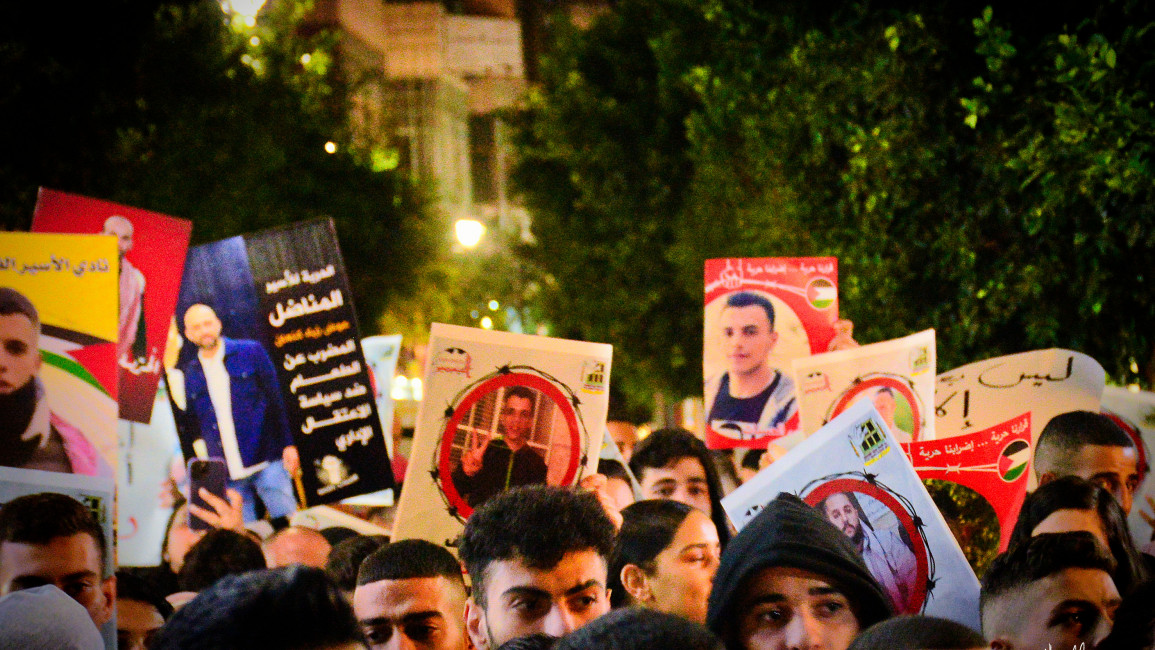Israel's post-7 October policies unleash disease among Palestinian prisoners, warn human rights groups
The Palestinian Prisoners' Club warned on Sunday, 21 January, that disease is spreading among Palestinian prisoners and detainees held in Israeli jails due to overcrowding cells and deteriorating sanitary conditions since 7 October.
In a statement on Sunday, the Prisoners' Club said that according to available data gathered through testimonies of Palestinians released from Israeli jails, there is a spread of skin diseases among Palestinian detainees.
The statement pointed out the overcrowding of jail cells, the severe reduction of water access and the lack of clothes due to Israeli confiscation of hygiene products, forcing detainees to wash their clothes and wear them while still wet.
Palestinian prisoner Muhammad Al-Khatib has been released after 21 years from Israeli prisons, in extremely poor health, having endured deliberate medical neglect for years. Anabta, Tulkarm. pic.twitter.com/hKfL5XrP3X
— Quds News Network (@QudsNen) January 21, 2024
The Prisoners' Club also noted that since 7 October, Israeli authorities have increased the number of Palestinian detainees per cell up to 10 detainees in each cell, which has made sanitary conditions of Palestinian detainees more acute.
A source at the Palestinian Addameer Prisoners Support Association, who asked not to be named, told The New Arab that "sanitary conditions in the occupation jails have deteriorated rapidly in the past three months to a critical point".
"Since 7 October, the occupation shut down the prison stores known as the 'Cantine', where detainees used to purchase hygiene products and additional food from their own money that families used to pay the prison for them", said the source.
"For three months, Palestinian prisoners and detainees have not been able to purchase anything and have been depending exclusively on what the prison provides, which according to all released prisoners is very little and bad quality food, and very little quantities of cleaning products", went on the source.
Secretary General: this is a watershed moment. With a genocide unfolding in Gaza, it's time to ask for justice for ALL. Hostages MUST be released immediately. And so the thousand Palestinian prisoners arbitrarily detained by Israel. Please do not forget them. https://t.co/8IEziy3JCN
— Francesca Albanese, UN Special Rapporteur oPt (@FranceskAlbs) January 22, 2024
"For sick prisoners and detainees who need to take medicine, the lack of food is a serious problem as they can't take their medicine on time when they haven't eaten enough", they stressed.
"Also, the occupation authorities have stopped taking prisoners to external clinics and hospitals for specialised treatment, and this is particularly critical for cancer-ill prisoners", they added.
ِAddameer pointed out the case of Palestinian prisoner Asef Al-Refai, 22 years old, who suffers from advanced-stage colon cancer, which has spread to other of his internal organs.
Al-Refai was diagnosed with cancer before his fourth arrest in September 2022. Yet, his family told Palestinian media that Israeli authorities didn't provide him with his medication following his arrest and denied that he had cancer.
Last November, the Palestinian High Commission for Prisoners' Affairs warned that Al-Refai's health condition had deteriorated severely after he didn't take his chemotherapy session because his body was too weak to support it.
Currently, the number of ill Palestinians in Israeli jails is estimated by Palestinian human rights groups to be more than 600, 24 of whom have cancer.
The total number of Palestinians in Israeli jails stands at 7,000, including 62 women, 200 children and 2,070 detainees without charges under the Israeli 'Administrative Detention' system.



